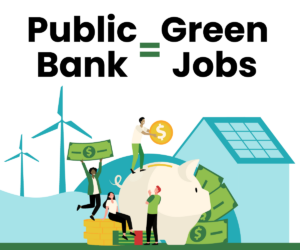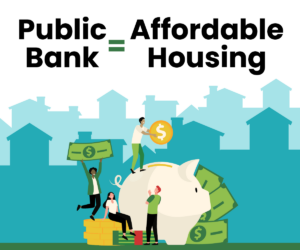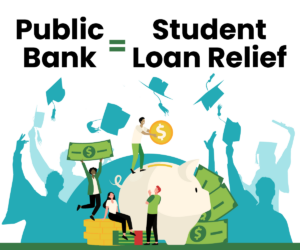
Big banks and Wall Street extract billions from our economy
Our economy turns human rights, lives, and needs into commodities for large banks to profit from. This is efficient for the ultra rich—and disastrous for the rest of us. That is why New Jersey needs a public bank that invests in the public good!
How can a public bank help? By utilizing our own money, we can stop the inefficient and expensive process of the state investing in and borrowing from Wall Street, and paying back huge interest rates. This can save New Jersey millions of dollars!
A public bank can make non-predatory investments at below market rate in the things we value, areas where Wall Street sees no profit, or opportunities to exploit the poor and working class. These include:
- Student debt mitigation
- Infrastructure
- Small businesses and economic development
- Affordable housing for every New Jerseyan
The state government of New Jersey collects billions of dollars in revenue from taxes and fees every year and deposits them into Wall Street banks. Meanwhile, rampant inequality had led to a smaller tax base—meaning less money for public institutions and infrastructure projects.
Wall Street then lends money back to us to finance these projects, sometimes collecting double the cost of the project in profits on the backs of taxpayers!
While this happens, Wall Street also continues to exploit average New Jersey residents and workers through predatory lending and financial strip-mining.
A state bank can undo this vicious cycle, which turns human rights and our democracy into profits for the ultra rich, by providing a public institution which can invest in the public good instead of private profits!
Tell state leadership to divest from Wall Street and invest in us- demand a public bank in New Jersey!
Tell us your story: send us a 30 second video, or your story in writing, on how debt has affected your community, or to demand a public bank in NJ, and send to publicneed@njwec.org
Our demands:
That New Jersey establishes a public bank, which invests in:
Worker Justice
Wall Street banks often lend highly predatory loans to small businesses, and to the state for infrastructure projects, siphoning millions of dollars away from taxpayers and workers in the process, and locking out small business owners and entrepreneurs of color. A Public Bank can issue non-predatory loans with the explicit purpose of lifting up these groups. |
Green Jobs
Currently our state struggles to find adequate financing for critical green infrastructure projects. When we do find adequate financing, it usually comes from major banks that are also investing in the major drivers of climate change to begin with. A public bank could provide access to credit for the state in pursuit of green energy projects which provide good paying union jobs to New Jerseyans. |
|---|---|
Affordable Housing
Wall Street has historically used housing as a tool to engender racism and to exploit the working class, systemically locking people of color out of decent mortgages and driving a homelessness crisis that drives up the cost of housing. A public bank could work through community banks to make affordable loans to residents who would have been exploited by Wall Street’s interest rates or locked out of home ownership entirely. |
Student Loan Relief
As college becomes an increasingly expensive barrier to entry for many jobs, Wall Street exploits poor and middle class students by offering highly predatory loans at exorbitant rates with extremely unfavorable terms for borrowers. A public bank can work through community banks to refinance loans at below market rates on non-predatory terms. |
How does it work?
The state government of New Jersey collects billions of dollars each year from multiple sources of revenue, including taxes, fees, fines, etc. and deposits them into Wall Street banks. These banks use this money for their private purposes and interests anywhere in the world, recently returning about 1% to New Jersey for the privilege of holding our money. When the State needs money for infrastructure, like transit projects or school upgrades, it goes back to these same banks to borrow money, often at considerable expense, often doubling the financing cost of public projects. This arrangement has continued uninterrupted for generations and this financing practice has created a national portfolio of state and municipal debt now approaching $6 trillion dollars.
In 2016, the state and municipalities of New Jersey paid more than $1 billion in fees and $3 billion in interest to Wall Street for debt service. Payment of these debt costs are typically prioritized over meeting the public purpose for which they were borrowed.
A state bank would enable the public to take more efficient and productive control of the state’s money, realize the same leveraging power of all banks, save significant sums by self-financing, and create a new source of revenue from lending/investing in state interests and objectives. This cycle of money flow would reverse upward trends for state debt and taxes that extract public wealth, and properly redirect state resources toward public interests.
Once fully established, the state bank can provide substantial new lines of affordable credit for infrastructure projects, including energy efficiency upgrades on our public buildings, especially schools, hospitals, libraries and community centers. By keeping the State’s substantial deposits at work in the state, NJ can leverage and multiply public assets to meet public needs, while avoiding the speculative risks of Wall Street.
The state bank will bring a new resource to the chronic challenges of financing public needs such as infrastructure, as well as enable new investment in various other priorities such as affordable housing, student loans, small business, energy efficiency upgrades and renewable energy development. As a formidable partner for state-based financial institutions like community banks, credit unions and development agencies, the state bank will enable new lines of credit for needs that typically go unaddressed.



